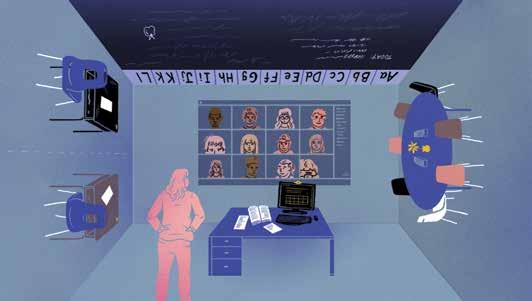
3 minute read
Executive Director’s Message
Pivot, Stretch, Lead
Some new practices are here to stay
Advertisement
As you read this article, we will all have spent more than 18 months leading in a pandemic – leading schools, organizations, family units, even ourselves during trying and intensely uncertain circumstances. As human beings, it’s inevitable that during, and even following difficult times, we tend to focus on what we’ve lost, what’s different. A perfect example of this has been the recent focus – we would say, much to the disadvantage of our students – on the “learning loss” or “learning gaps” caused by the pandemic. At the OPC, we’ve been consciously trying to change that conversation by disrupting the focus on the negatives and shifting our collective thinking to the positive. We’ve been creating space to talk about and celebrate the resiliency that’s been forged in students, staff, our families and even ourselves during the pandemic.
Great leaders understand that crises are opportunities. Scott McLeod and Shelley Dulsky in their article, Resilience, Reorientation, and Reinvention: School Leadership During the Early Months of the COVID-19 Pandemic, gathered data from school and system leaders, staff and students across 43 school organizations from around the world. Their conclusions make their article a worthwhile read, but one in particular stands out for me. When we ourselves and the schools and people we lead are in survival mode during a crisis, the inclination is to “minimize damage, alleviate the pain and restore order” (Frontiers in Education, March 2021). However, so many of you have continued to problem solve, disrupt and encourage staff and students to try new things. These new ideas are the foundation for growth, allowing us to stretch, try something different and potentially create a better practice, approach or process.
Many of those interviewed by McLeod and Dulsky expressed a shared sentiment that there are “unexpected positive outcomes” emerging from the pandemic, including a new appreciation for the collective wisdom of the education community (consider for a moment the number of shared recommendations from Ontario’s education stakeholders over the past year), new structures of family engagement (virtual School Council meetings and parent teacher interviews are increasing parental participation), the expansive integration of technology, the creation of new resources, and, most importantly, the new appreciation and recognition of student voice and self-directed agency. While the nature of these “silver linings” may not be universal, the fact they exist is. School leaders have the opportunity to re-think the way things have always been done and pool the collective wisdom acquired through this pandemic, to prioritize the new ideas and strategies that have emerged.
The OPC, too, is embracing this mindset. We are striving to do more than just survive the pandemic. We’re exploring new ways to serve you on virtual platforms, fostering online connections, refocusing our professional learning offerings to meet your needs in a crisis, gathering real-time data that is immediately reinvested in advocacy efforts and conducting elections, Annual General Meetings and key governance meetings in hybrid or wholly online formats. It’s been a learning curve, and not all of our efforts have worked seamlessly. But we’ve learned, re-tooled and know that some of these practices are better than before. We are paying attention to these emergent silver linings and recognize that some are worth keeping. They are here to stay.
From our provincial vantage point, we see and hear about your resilience and courage every day. Your new approaches, ideas to support staff and students, the creative ways you are solving pandemic challenges – these become best practices that need to be shared across the province. They are game changers. What we need to do is take a breath and find the time to recognize these innovations, build on them and ensure they continue long after the pandemic settles down. This is what resiliency and leadership growth look like.
By: Allyson Otten, Executive Director
Email: aotten@principals.ca








